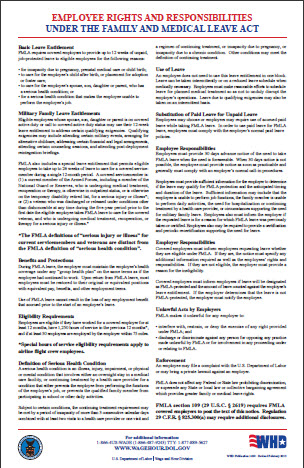By Brad Cave
Did Solvay Chemicals fire long-time employee Steven Smothers because of a first-time safety violation or because the company was tired of his frequent absences due to an ongoing medical disability? The Tenth Circuit Court of Appeals recently ruled that Smothers provided sufficient evidence to suggest that Solvay’s stated reason for his termination was pretextual, allowing his claims for unlawful retaliation under the Family and Medical Leave Act (FMLA) and discrimination under the Americans with Disabilities Act (ADA) to proceed. Smothers v. Solvay Chem., Inc., No. 12-8013 (Jan. 21, 2014). The Court affirmed the grant of summary judgment on his state law claim for breach of an implied employment contract.
Medical Treatments and Severe Pain Lead to Frequent FMLA-Protected Absences
For eighteen years, Smothers worked as a surface maintenance mechanic in Solvay’s trona mine in Sweetwater County, Wyoming. The company considered him to be an excellent mechanic who did great work and got along with everyone. In 1994, Smothers injured his neck and developed degenerative disc disease in his spine. Over the next five years, Smothers had three surgeries to his neck as well as numerous other medical procedures. Despite treatment by a specialist, Smothers continued to have severe ongoing neck pain, severe migraine headaches and lower back problems. At times, Smothers was unable to work without pain treatments and he often was able to sleep only a few hours each night due to the pain.
Smothers asked for and was granted FMLA leave for intermittent absences caused by his condition. Managers and co-workers began to complain about his absenteeism, especially because he worked on the graveyard shift where there were fewer workers to absorb his absences resulting in increased overtime costs. Solvay’s production superintendent Melvin Wallendorf pressured Smothers to change to the day shift, but Smothers refused as the shift change would have cost him about $7,000 a year. Solvay’s human resources department advised Wallendorf that urging Smothers to switch shifts would violate the FMLA so Wallendorf stopped pressuring Smothers but did not stop complaining about his absences.
At one point, Wallendorf and Rick Wehrle, Smothers’ direct supervisor, gave Smothers a poor performance rating on his evaluation due to his absenteeism. In 2005 or 2006, Smothers applied for a promotion but was told that he was rejected because of his absences.
Safety Issue Explodes into Argument
In 2008, the graveyard crew conducted a routine maintenance acid wash to remove build up in its equipment. After a line ruptured, Smothers saw that a damaged “spool piece” had caused the problem and prepared to remove it. Another mechanic, Dan Mahaffey, suggested that Smothers wait for a line break permit, which is a form that certifies that employees have completed a checklist of precautions before a line can be safely disconnected. Smothers said that a permit wasn’t required because the line was already broken. Mahaffey and Smothers then argued. Mahaffey offered help on the repair which Smothers refused. Mahaffey took offense and accused Smothers of hypocrisy since Smothers had previously reported others for safety violations. Smothers made an offensive comment to Mahaffey and told him he did not want his kind of help. Smothers removed the broken piece and began the repair.
Mahaffey immediately reported the argument and Smothers’ removal of the spool piece without a line break permit to the area supervisor. Later that same day, three managers called Smothers in to discuss the safety violation. Although completing the line break permit may not have been absolutely necessary, Smothers later conceded that he should have locked out the pump valve before removing the part according to Solvay’s safety policies. Smothers apologized for not locking the pump valve before removing the piece and promised it wouldn’t happen again. Smothers was sent home pending an investigation.
Six managers were involved in deciding what to do about the argument and the safety violation. Three of the managers personally talked with Mahaffey about the argument but no one spoke to Smothers about it. About eight days later, Solvay fired Smothers. Smothers sued in Wyoming federal court, alleging, among other claims, unlawful FMLA retaliation, ADA discrimination and breach of an implied employment contract based on Solvay’s employee handbook.
FMLA Claim Bolstered By Disparate Treatment and Previous Retaliatory Acts
The trial court granted summary judgment to Solvay on Smothers’ FMLA and ADA claims. On appeal, the Tenth Circuit decided that Smothers presented enough evidence for a trial about whether Solvay’s real reason for his termination was his use of FMLA leave or his disability. Smothers provided evidence that other employees who committed similar safety violations were not fired. Five of the six decision-makers who fired Smothers were also involved in at least one decision in which a similarly situated employee was treated more favorably after violating the same or comparable safety rules. Smothers also pointed to the negative comments, negative performance rating, failure to promote and pressure to change shifts because of his FMLA-protected absences as evidence that the safety violation was a pretext for firing him for his FMLA leave. Moreover, Smothers showed that the decision-makers had failed to sufficiently investigate the argument he had with Mahaffey, basing their decision almost entirely on Mahaffey’s version of events. The Court decided that a reasonable jury could find that Solvay’s investigation into the quarrel was not fair or adequate. Based on this evidence, the Court found that there were issues of fact on whether Solvay’s termination reasons were pretextual and reversed the dismissal of Smothers’ FMLA retaliation claim.
Smothers Was Disabled Under ADA
Smothers also asserted that his firing was in violation of the ADA. He presented evidence that his medical condition was an impairment that substantially limited a major life activity, specifically his ability to sleep. Because the facts would allow a reasonable jury to conclude that Smothers’ sleep was substantially limited, Smothers satisfied his burden of establishing a prima facie case of disability discrimination. As with the FMLA claim, the Court found sufficient evidence that Solvay’s stated termination reasons may have been a pretext for disability discrimination. Therefore, the Court reversed the dismissal of Smothers’ ADA claim as well.
No Breach of Implied Contract Based on Employee Handbook
Smothers also alleged that Solvay violated the terms of its employee handbook, giving rise to a claim for breach of implied contract under Wyoming law. The Court disagreed. Wyoming recognizes a claim for breach of implied contract if an employer fails to follow its own required procedures, such as the procedures laid out in an employee handbook. Solvay’s handbook contained a four-step progressive disciplinary process, with termination as the last step. But it also contained a provision that allowed Solvay to terminate an employee immediately for a serious offense, including a safety violation. Because the discipline policy unambiguously gave Solvay the discretion to fire employees who violate safety rules, the Court found that Solvay’s decision to terminate Smothers for violating a safety rule did not violate the terms of the employee handbook. Therefore, the appeals court upheld the trial court’s dismissal of Smothers’ breach of implied contract claim.
Back To Court They Go
We don’t know whether Smothers or Solvay will prevail if this case goes to trial but we do know that the appellate court thought that some of the evidence about the actions of Solvay managers could demonstrate that Solvay acted with a discriminatory motive:
- Supervisors and co-workers gave Smothers a hard time about taking FMLA-protected leave.
- Solvay failed to properly investigate all sides in the quarrel, accepting one employee’s version of events as fact.
- The decision-makers treated Smothers more harshly than other similarly-situated employees who had violated similar safety rules.
- Managers and supervisors considered Smothers’ FMLA absences when providing his performance evaluation and rejecting him for a promotion.
Evidence of these actions prevented Solvay from obtaining a grant of summary judgment on appeal. While Solvay may dispute Smothers’ evidence when the case actually goes to trial, this case stands as a lesson about the kinds of supervisory comments and actions that can feed into a discrimination claim, and a good reminder of how carefully employers must manage employees with injuries or disabilities.
Click here to print/email/pdf this article.







